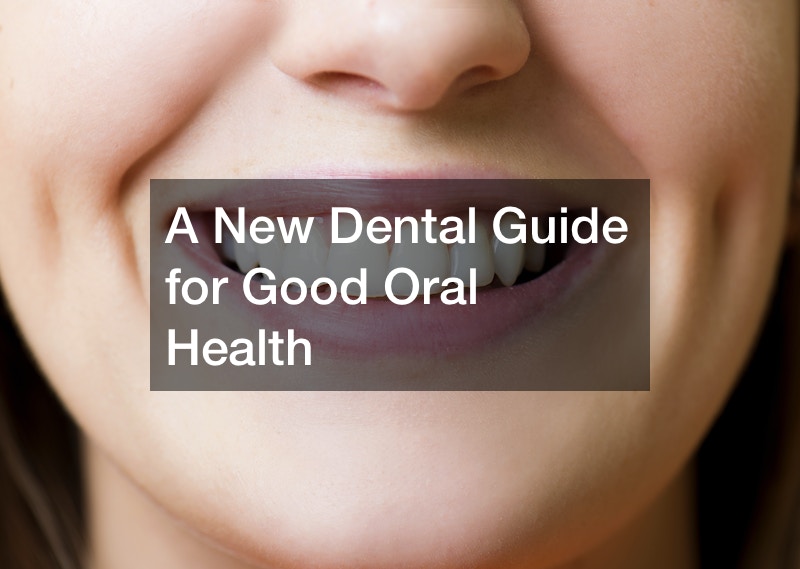
Your oral health is vital to maintaining your overall well-being and health. That’s why taking care of your gums and teeth is crucial. Although flossing and brushing are essential, they aren’t enough to keep your oral health at optimum level. So you should also schedule regular appointments with your dentist for professional checkups and cleanings.
In addition to investing in a new dental care routine, there are various things you can do to keep achieving good oral health. It includes avoiding sugary drinks and food and eating a balanced diet with plenty of vegetables to keep your gums healthy. Here’s a new dental guide to achieving good oral health.
Good Oral Health

Maintaining optimum oral health is essential to your overall health as a human being. Brushing and flossing your teeth daily and keeping up with regular dental appointments are vital. Brushing and flossing help to remove plaque, a sticky film of bacteria that forms on your teeth. Plaque is responsible for causing gum disease and cavities, hence the emphasis on brushing and flossing your teeth. To make brushing effective, you must use a soft-bristled toothbrush and fluoride toothpaste. As you begin brushing, hold the toothbrush against your teeth and brush the bristles in a circular motion. Follow the same action as brushing your teeth’ front, top, and back. Next, use gentle back-and-forth strokes on your molars’ chewing surfaces before spitting out the toothpaste after brushing.
Flossing is another popular way of maintaining a new dental routine and helps to remove plaque and food particles from under your gum lines and between your teeth where your toothbrush bristles can’t reach. To make your flossing process effective. You need to wind the floss around your middle fingers and hold it tightly, then curve it around the base of each tooth. Next, proceed to gently slide the floss up and down the side of each tooth before spitting the floss out after you finish the procedure.
Visiting your dentist regularly is ideal if you want to maintain your family’s optimum oral health, especially if you have kids that are still attending schools. During a new dental routine cleaning, your dentist will eliminate tartar and plaque from your teeth. They’ll also inspect for gum disease, cavities, and other oral health issues. By flossing and brushing regularly and visiting your dentist often, you can help maintain optimum oral health.
Benefits of Good Oral Health
Perfect oral health is vital for many reasons, including following a new dental routine. It can help prevent bad breath, avoid gum disease, and keep your teeth and gums healthy. Furthermore, good oral health can help you speak and eat more effectively. There are various benefits of maintaining optimum oral health, including the following.
1. Avoid Cavities and Tooth Decay
Tooth decay and cavities are some of the most prevalent oral health issues. They occur when bacteria build up on teeth and produce acids that destroy tooth enamel. It can lead to sensitivity, pain, and even tooth loss. Maintaining good oral hygiene habits can help you avoid tooth decay and cavities. It includes brushing your teeth at least twice daily, flossing regularly, and using mouthwash. Moreover, you should schedule dental visits regularly for checkups and routine cleaning.
2. Preventing Gum Disease
Gum disease is another well-known oral health issue most people experience. It occurs when bacteria build up on gums and teeth, leading to infection and inflammation. If ignored, gum disease can lead to tooth loss, and maintaining good oral health can help you prevent this. It includes brushing your teeth regularly and keeping up with your dental visits for checkups and cleanings.
3. Avoid Bad Breath

Bad breath, which is also known as halitosis, is another oral health issue you may experience if you don’t follow a new dental procedure. It occurs when bacteria build up on gums and teeth and other factors such as consuming specific drinks and foods, dry mouth, and smoking. Maintaining good oral hygiene can help you prevent this, along with visiting your dentist frequently for dental checkups.
4. Improve Your Overall Health
Good oral health is crucial for your overall health and leads to a healthy lifestyle. It’s because oral health issues like gum disease, for instance, can lead to other health issues like heart disease, among other issues. Furthermore, maintaining optimum oral health is beneficial for avoiding problems such as difficulty in speaking and poor nutrition.
5. Save Money
Good oral health is also ideal for saving costs on treatment. It’s because oral health issues are often costly to treat. Moreover, good oral health can help you avoid missing work days and losses due to decreased productivity.
Oral Health Issues
It’s a well-known fact that oral health can cause various health issues. You may not be aware of how prevalent these health issues are. Many of these oral health issues dentists see daily are easily preventable if you maintain proper oral care. Here are some of the common oral health issues a person may experience.
Cavities are one of the most widespread oral health issues most people face. These cavities form when a tooth’s enamel weakens, allowing bacteria to prevail and damage the tooth. Overall, cavities can be painful, and if ignored, they may lead to severe health issues.
Gum disease is another common oral health condition that can cause severe health issues if not treated as soon as possible. Gum disease occurs due to plaque buildup on the gums and teeth. If not taken care of, plaque can harden and turn into tartar, which irritates gums and causes inflammation.
Bad breath, or halitosis, is a common oral health problem that occurs due to various things, such as medical conditions, specific foods, and poor oral hygiene. If you have bad breath, it’s vital to consult a dentist and find suitable treatments for the condition.
Tooth Sensitivity: Tooth sensitivity is a well-known oral health problem that may occur due to various things, including wear and tear of teeth, gum disease, and tooth decay. If you have tooth sensitivity, it’s crucial to visit your dentist, who can help you to identify its cause and find ideal treatments for the condition.
Discolored teeth are a typical oral health issue caused by several things, such as your medical prescription, consuming specific drinks and foods, and smoking. If you have this oral health issue, it’s vital to schedule an appointment with a dentist and find out what you need to do to revert the issue.
You may need to visit a dentist for these common oral health problems. By taking care of your teeth and gums properly, you can help prevent these issues from occurring. It’s also advisable to schedule regular dental appointments for routine cleanings and a new dental checkup.
How to Prevent Oral Health Issues

It’s a well-known fact that practicing good oral hygiene is vital for maintaining optimum dental health. With so many dental products circulating in the market today, knowing what steps you should take to care for your gums and teeth can be challenging. Here’s a guide you can follow to practicing a new dental oral hygiene habit:
Brush your teeth at least twice daily: Ensure you brush your teeth at least twice daily, preferably once in the morning and at night. If possible, brush after every meal to remove plaque and debris. Plaque is a sticky bacterial film that forms on your gums and teeth, and if it’s not eliminated, it may harden to tartar, which causes gum disease.
Use a toothpaste containing fluoride: Fluoride is a mineral that helps prevent cavities by strengthening tooth enamel. Purchase a toothpaste containing fluoride, ensure to use it appropriately, and follow the instructions outlined in the package.
Use a soft-bristled toothbrush: A soft-bristled toothbrush has gentle qualities, meaning it won’t damage your tooth’s enamel. Ensure you replace your toothbrush regularly, usually three to four months, or immediately if you notice the bristles begin fraying.
Flossing is just as crucial as brushing your teeth because it helps to remove food debris and plaque between your teeth and beneath your gumline, which is inaccessible for your toothbrush. Ensure you floss at least once a day to achieve prolific results.
Mouthwash is helpful in removing food debris and plaque from your mouth and also freshening your breath. Ensure you look for a mouthwash containing fluoride and use it according to the instructions outlined in its package.
Visit your dentist regularly. Even if you maintain rigorous oral hygiene habits in a new dental routine, you should still set up appointments with your dentist for cleanings and checkups. Your dentist can remove tartar and plaque from your teeth and perform professional tooth cleaning procedures. They can also check for signs if you have gum disease or tooth decay.
Products You Should Use for Good Oral Health

Good oral health is crucial for maintaining optimum health and general well-being. Poor oral health is responsible for various health issues, including diabetes, stroke, and heart disease. A healthy mouth allows you to speak and eat quickly and boosts your confidence when smiling.
For good oral health, you should follow teeth cleaning procedures such as using fluoride toothpaste to brush your teeth twice daily, flossing, and visiting your cosmetic dentist regularly for checkups and cleaning. Additionally, you should also use various products to keep your mouth healthy and ensure your smile remains perfect. Here are some of the products you should use if you want good oral health:
Toothpaste: When it comes to choosing an ideal toothpaste, fluoride is the best option. Fluoride helps prevent cavities by hardening tooth enamel and increasing its resistance to decay. Ensure you buy toothpaste containing fluoride and one with the American Dental Association, or ADA, seal of approval.
Mouthwash is beneficial for freshening up your breath and removing bacteria and plaque from gums and teeth. Look for a mouthwash that has fluoride and the ADA’s seal of approval.
Interdental cleaners such as interdental brushes and dental floss help remove bacteria and plaque below the gum line and between your teeth. They’re especially beneficial if toothbrushes or floss can’t access these areas. Tongue cleaners effectively remove bacteria and plaque from your tongue, freshen up your breath, and help prevent gum disease and cavities.
Electric toothbrushes are more effective than traditional toothbrushes at eliminating bacteria and plaque from teeth. It’s wise to purchase an electric toothbrush with the ADA’s approval seal.
Water flossers incorporate water usage in removing bacteria and plaque from gums and teeth. They’re especially beneficial if you have clear braces or an Invisalign aligner, among other dental appliances.
Dental picks are small, pointy tools that can assist you in removing food debris and plaque from your teeth. They’re beneficial if you want an effective braces cleaner or other dental appliances, such as compressors installed in your mouth.
Dental floss holders will make your flossing more straightforward and effective by holding it in the correct position and helping prevent it from slipping. Dental sealants are thin, protective coatings you install on the chewing surfaces of your back teeth. They help prevent cavities by sealing out plaque and food.
Fluoride supplements can help in the prevention of cavities if you don’t have access to fluoridated water or dental products. You can find fluoride supplements in many forms, such as rinses, drops, and tablets.
It’s vital to have good oral health because your mouth is one of the things that indicate the state f your overall health. Poor oral health is known to cause various health issues, such as diabetes, stroke, and heart disease. Therefore, it’s imperative to take good care of your gums and teeth and visit your dentist regularly. There are a few things you can do to maintain good oral health. First, brush your teeth at least twice daily with fluoride toothpaste. It will help you prevent cavities from forming and also tooth decay.
Additionally, you should floss your teeth daily to remove bacteria and plaque that may cause gum disease. Finally, ensure you eat a balanced diet, invest in your personal fitness schedule, and avoid consuming sugary drinks and foods. If you have optimum oral health, you’ll feel better about yourself and are less likely to develop severe health issues. For this and many other reasons, you should ensure you take proper care of your teeth to maintain good oral health and remain faithful to a new dental routine.




